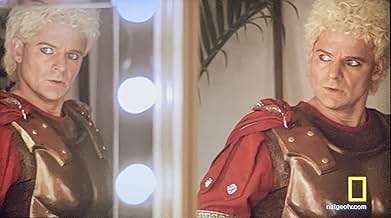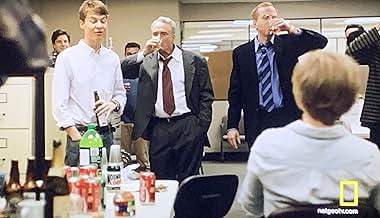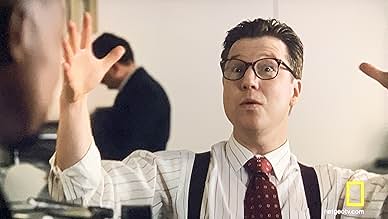Doku-Drama mit echten Interviews über den Tech-Boom der 1990er Jahre im Silicon Valley.Doku-Drama mit echten Interviews über den Tech-Boom der 1990er Jahre im Silicon Valley.Doku-Drama mit echten Interviews über den Tech-Boom der 1990er Jahre im Silicon Valley.
- Auszeichnungen
- 8 Nominierungen insgesamt
Folgen durchsuchen
Empfohlene Bewertungen
I lived through this. Even visited Netscape in New York while working for SGWarburg in the UK. The senior analyst working on the floor above me sold his Mozilla (his name of the source) code to a young guy in the US for what we were lead to believe was roughly 10k pounds.. We used to tease him about it. So, perhaps the original premise of the origination is perhaps a tad skewed.
I still have the the original documentation encapsulating the beyond browser technical specs for a hybrid between browsers and email which indeed my team created, which in turn became Outlook after our MS partners stole it. It really is plain to see were you to simply look at the original specs. So the documentary is absolutely accurate in how aggressive MS was back in the day.
I actually employed a Pixelon senior technician. He became an SGWarburg director, which trust me was not all it was cracked up to be. He turned out to be a wife beater and ended up in an Californian jail after being tracked down and extradited for previous misdemeanors to a female employee in the US. Which kind of summarises the Pixelon culture. Go #MeToo.
As a production presenting the times this rendition is both mildly inaccurate and entirely American centric. The internet after all was not invented by Americans, DARPA not withstanding. Oddly it was actually one of these rare things that came out of a bipartisan collaboration originating in Switzerland. But hey, far be it for me to attempt to represent an actual representation of the history I worked through, participated in and indeed continue to retain original documentation defining the instigation inherent in the actuality of this period.
This production is worthy. Perhaps it will encourage viewers to look further.
I still have the the original documentation encapsulating the beyond browser technical specs for a hybrid between browsers and email which indeed my team created, which in turn became Outlook after our MS partners stole it. It really is plain to see were you to simply look at the original specs. So the documentary is absolutely accurate in how aggressive MS was back in the day.
I actually employed a Pixelon senior technician. He became an SGWarburg director, which trust me was not all it was cracked up to be. He turned out to be a wife beater and ended up in an Californian jail after being tracked down and extradited for previous misdemeanors to a female employee in the US. Which kind of summarises the Pixelon culture. Go #MeToo.
As a production presenting the times this rendition is both mildly inaccurate and entirely American centric. The internet after all was not invented by Americans, DARPA not withstanding. Oddly it was actually one of these rare things that came out of a bipartisan collaboration originating in Switzerland. But hey, far be it for me to attempt to represent an actual representation of the history I worked through, participated in and indeed continue to retain original documentation defining the instigation inherent in the actuality of this period.
This production is worthy. Perhaps it will encourage viewers to look further.
Hybrid Docu-Drama, where some of the prime-movers appear in cameo to describe their exploits, intertwined with actors that act out the same events. The process is brought down a bit by simply too much information, kind of a docu-drama for dummies. Still, the subject matter is fascinating, as were those times. No idea where the thing is headed but my best guess is that a big fat torpedo will be launched at the memory of Microsoft mid-series, since a great deal of the setup seems to be super friendly to the legacy of Netscape and the 'nerds are antisocial brainiacs' fanboy movement. Witness the silly placements of oddly pretentious Arianna Huffington thoughts. I guess finding humor is easier that finding an understanding of the things that make one's life work, 20 years after.
I lived and worked through this era in the DC area with one of the first nationwide commercial ISPs. It's why I made a point of watching Valley of the Boom and why I really enjoyed it.
I understand some people's confusion or disappointment with aspects of the series but not the number of low stars or the depth of the nasty reviews. It was much better than that, especially as the episodes progressed.
I admit I was a little put off at first by the "breaking-the-fourth-wall" moments and musical numbers, but I grew to appreciate their function. The little math whiz explaining IPOs and the developer explaining open source with the chicken salad sandwich were spot-on and a much better way to explain them to viewers who don't know about those concepts than through standard exposition.
And the interviews with the actual people involved -- especially the secondary players, whom you would otherwise rarely hear from in a documentary -- were worth watching the entire series for. The acting, too, brought their moments to life in a really credible way. (The actor's characterization of Marc Andreessen was so much like a CTO colleague from that time that it triggered some pretty uncomfortable feelings and memories.)
I haven't thought about those moments from my career or, more accurately, felt like that about them in a very long time. For me personally, that's a good measure by which to judge the success of the series.
I understand some people's confusion or disappointment with aspects of the series but not the number of low stars or the depth of the nasty reviews. It was much better than that, especially as the episodes progressed.
I admit I was a little put off at first by the "breaking-the-fourth-wall" moments and musical numbers, but I grew to appreciate their function. The little math whiz explaining IPOs and the developer explaining open source with the chicken salad sandwich were spot-on and a much better way to explain them to viewers who don't know about those concepts than through standard exposition.
And the interviews with the actual people involved -- especially the secondary players, whom you would otherwise rarely hear from in a documentary -- were worth watching the entire series for. The acting, too, brought their moments to life in a really credible way. (The actor's characterization of Marc Andreessen was so much like a CTO colleague from that time that it triggered some pretty uncomfortable feelings and memories.)
I haven't thought about those moments from my career or, more accurately, felt like that about them in a very long time. For me personally, that's a good measure by which to judge the success of the series.
Most of the reviews are a riot over the confusion of documentary or drama. I believe the fact here is, the stories they were able to portray. If you want to learn about the..boom, this is your best bet. It's also the most accurate of portrayals for Silicon Valley. All I ask, leave your mind open to other ways cinema, story telling can be shot.
This should be a 7.5 but I rounded but bc it's the nice thing to do especially because this is way better than a 6.4. I've read the user reviews and a lot of them bash the story telling, claiming to be very disappointed because they were very interested in the subject matter yet the show did not provide the straightforward clinical examination they were expecting. It seems as though the trailer may have created expectations that the show did not deliver. I watched this without having seen a trailer and was pleasantly refreshed by the choice to use this innovative style of docudrama. To all of the reviewers saying why on earth would they do this? Let's call it what it is: it's ripping off the Big Short, which was a hugely successful and applauded business film. The style of the big short made a story about finance accessible to people unfamiliar with the subject matter. I'm glad NatGeo tried to do something different. It definitely hits and misses. Certain aspects of it are great, while others, like some of the casting decisions, the rapping, super long dance sequences, cartoonish hypotheticals, fourth wall breaking (which I didn't hate) take the viewer of the story. Here's what I do applaud this series for and why I give it a high rating, and why it hooked me: the storylines. I have never heard of Michael Fenne, Pixelon or The Globe.com. If it weren't for this series, I'm sure I'd never have heard about these companies. Also, Netscape is usually second fiddle to other stories and I loved getting a deep dive. I'm a huge fan of the decision to focus on these stories. I find them very compelling and watching them dramatized with the real life talking heads worked for me. Steve Zahn as Michael Fenne is extraordinary. While it's stylistic choices may turn some off, especially those expecting something straightforward, I found myself looking forward to the next episode while watching this series and I personally can't say that for too many shows these days.
Wusstest du schon
- VerbindungenReferenced in Hollywood Game Night: Kiss Me in Lamorne-ing (2019)
Top-Auswahl
Melde dich zum Bewerten an und greife auf die Watchlist für personalisierte Empfehlungen zu.
- How many seasons does Valley of the Boom have?Powered by Alexa
Details
- Erscheinungsdatum
- Herkunftsland
- Offizieller Standort
- Sprache
- Auch bekannt als
- El Boom de Silicon Valley
- Drehorte
- Produktionsfirma
- Weitere beteiligte Unternehmen bei IMDbPro anzeigen
- Laufzeit1 Stunde
- Farbe
Zu dieser Seite beitragen
Bearbeitung vorschlagen oder fehlenden Inhalt hinzufügen





































